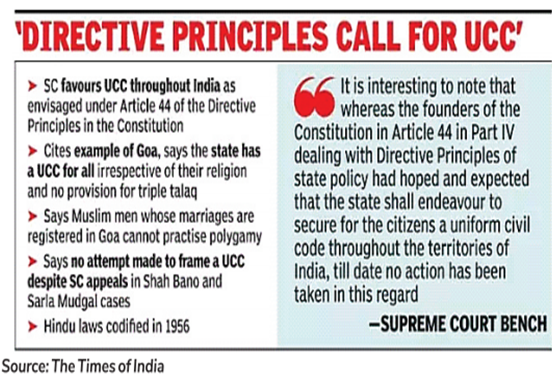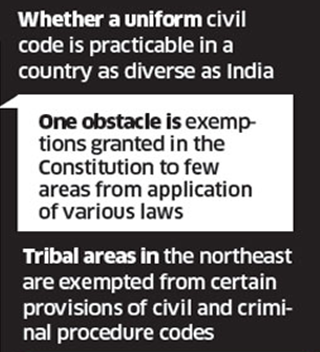In News:
- The Uttarakhand government recently announced the formation of an expert committee to examine ways for implementing a uniform civil code, including a review of laws governing marriage, divorce, maintenance, inheritance, adoption and other personal laws.
- The committee will be led by retired judge Justice Ranjana Prakash Desai, who is also the current chair of the delimitation commission.
What’s in today’s article:
- The Uniform Civil Code
- Background
- About
- UCC vs personal laws
- Importance
- Challenges
- Will Uttarakhand be the first state to bring UCC?
- Way ahead
The Uniform Civil Code (UCC):
- Background:
- The idea of a UCC has been present in some form in India since British rule.
- However, while the British desired the codification of various laws concerning crime, contracts, evidence, etc, they desired to keep Hindu and Muslim personal laws separate as part of their divide-and-rule policy.
- As a result, while criminal laws in post-independent India are uniform and apply equally to all citizens (regardless of religious beliefs), personal laws implemented through civil laws are influenced by faith.
- About UCC:
- A Uniform Civil Code provides for one law that applies to all religious communities in personal matters such as marriage, divorce, inheritance, adoption, etc.
- In India, Article 44 in the Part IV (Directive Principles of State Policy (DPSP)) of the Indian Constitution lays down that the state shall endeavour to secure a Uniform Civil Code for the citizens throughout the territory of India.
- Article 44 was incorporated into the Constitution as a provision that would be fulfilled when the nation was ready to accept it and the UCC could be socially accepted.
- UCC Vs Personal laws:
- Personal laws (mentioned in the Concurrent List of the Schedule VII of the Indian Constitution) are laws that apply to a certain group of people based on their religion, caste, faith and belief made after due consideration of customs and religious texts.
- For example, Hindu personal law is based on ancient texts like Vedas, Smritis and Upanishads and modern concepts of justice, equality, conscience etc. While, Muslim personal law is primarily based on the Quran and Sunnah.
- The introduction of a UCC is likely to annul all such codified laws and bring in a law that would be common to all citizens.
- Importance of UCC:

- It will simplify the complex laws around marriage ceremonies, inheritance, succession, adoptions, etc, as the same civil law will then be applicable to all citizens irrespective of their faith.
- It seeks to address the discrimination against vulnerable groups (including women and religious minorities) and harmonise diverse cultural groups across the country.
- It aims to promote nationalistic fervour through unity.
- Challenges in implementing UCC:
- As defined in Article 37 of the Indian Constitution, the directive principles are not justiciable (not enforceable by any court) but the principles laid down therein are fundamental in governance.
- Article 44 uses the words “state shall endeavour” (other Articles in the DPSP chapter use words such as “shall be obligation of the state,” etc). This implies that the duty of the state is greater in other directive principles than in Article 44.
- It is looked upon as anti-minority and anti-tribal. For example, property succession and marriage laws are governed by traditional and customary procedures in Meghalaya.
- Similarly, tribal laws differ in other North-eastern states. As a result, UCC may cause some dissatisfaction in the North-eastern region.

- Will Uttarakhand be the first state to bring UCC?
- Uttarakhand may not be the first state to implement a Uniform Civil Code.
- Goa has a version of a UCC and it is the only state in India to follow a common law for all its citizens.
- The coastal state follows the Portuguese Civil Code, 1867, which is survived in accordance with the Goa, Daman and Diu (Administration) Act, 1962.
- Way ahead:
- According to a Law Commission of India’s 2018 consultation paper, a uniform civil code is "neither necessary nor desirable at this stage" in the country.
- The goal of a UCC should ideally be reached in a piecemeal manner, like the recent debate on the age of marriage.
- A just code is far more important than a uniform code.











